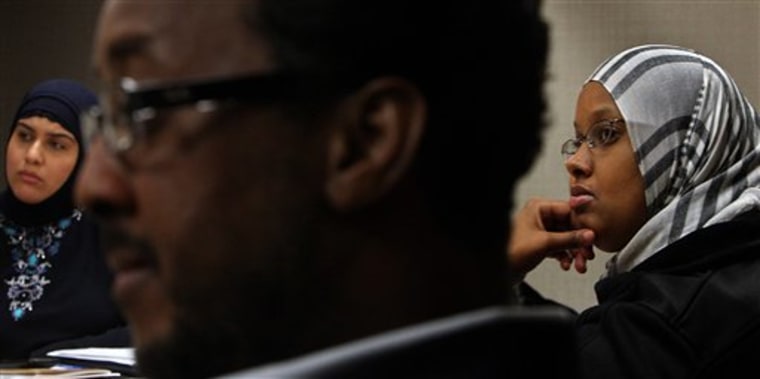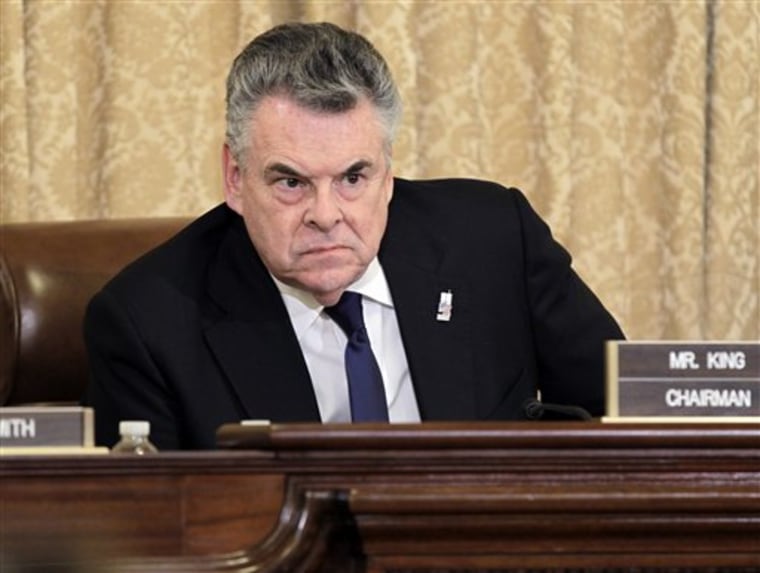The chairman of the House Homeland Security Committee is pressing forward with his public examination of Muslim extremism in America, pointing to his first, tense hearing on the subject as a step toward desensitizing a taboo topic and rooting out terrorists on U.S. soil.
"There's an elephant in the room and nobody wants to talk about it. We talked about it today," King said after the four-hour, emotion-filled session Thursday.
Just holding the conversation, he said, advanced the fight against al-Qaida's efforts to recruit one-man terrorist cells from within American Muslim communities and to suppress any effort to report those activities to law enforcement officials. King next will turn to the issue of Muslim extremism in American prisons in hearings planned later this year.
"I remain convinced that these hearings must go forward — and they will," King said as he opened Thursday's session.
But the conversation — a government examination of one religion in the U.S. — is fraught with distrust and political pandering that reflect the nation's ongoing struggle against terrorism nearly a decade after the Sept. 11 terrorist attacks.
The White House said America should not practice guilt by association.
"We also believe that Muslim Americans are very much part of the solution here and not the problem," presidential spokesman Jay Carney said Thursday.
Defiant King dismisses criticism
With photos of the burning World Trade Center and the Pentagon on display, Thursday's hearing opened with a defiant King condemning criticism from some Democrats, Muslim groups and the media as hysteria and political correctness. He did not release any new statistics on how many Muslims were helping root out terrorists or how many refused, or invite federal law enforcement officials to testify on the nature and extent of the threat he was examining.
Instead, the hearing featured testimony from the families of two young men who blame the Islamic community for recruiting them to terrorism. On the other side, one of the two Muslims in Congress wept while discussing a Muslim firefighter who died at the World Trade Center on 9/11.
Democrats said King should have focused the hearing on all groups that foster terrorism on American soil, including racists like the Ku Klux Klan and skinheads. To focus on just one group, Muslims, amounted to an abuse of power, discrimination and propaganda for al-Qaida, they said.
"Our words transcend this hearing room," said Mississippi Rep. Bennie Thompson, the senior Democrat on the committee. "Acknowledgment of an obligation to be responsible does not equal political correctness."
"This committee's approach to this particular subject, I believe, is contrary to the best of American values and threatens our security — or could, potentially," added Rep. Keith Ellison, D-Minn., the first Muslim elected to Congress.
Rep. Sheila Jackson Lee, D-Texas, challenged the assertion that some American Muslims resist cooperating with the search for terrorists in the U.S. by pointing to two witnesses who practice Islam.
"Muslims are here, cooperating. They are doing what this hearing has suggested that they do not do," she shouted. "Where are the uncooperative Muslims?
The California chapter of the Council on American-Islamic Relations recently put up a poster reading, "Build a wall of resistance. Don't talk to the FBI."
The national group, CAIR, often has made itself the public face of the Muslim community when talking about fighting terrorism and has an extremely strained relationship with law enforcement. The Justice Department has linked CAIR to a terror financing case and the FBI will not work directly with its members.
The American Muslim community is diverse and widespread. No single organization speaks for everyone, and the religion itself does not have a leader, as Catholics have the pope.

When young men have embraced a radical, violent view of Islam in the United States, they sometimes have done so in secret, without the support of knowledge of local religious leaders or their families.
'Call a terrorist what it is'
Melvin Bledsoe, whose son, Carlos, is charged with killing an Army private at a recruiting station in Little Rock, Ark., testified about his son's conversion to Islam and isolation from his family. Bledsoe said he didn't fully understand what was happening as his son became increasingly distant, stopped coming home for holidays and changed his name. He said the United States is not being aggressive enough about rooting out radical elements in the Islamic community.
Asked at the hearing what he wanted to gain by testifying, Bledsoe responded to the panel: "Call a terrorist what it is."
"I think we should forget about our political affiliations and conditions," he said.
Zuhdi Jasser, president of the American Islamic Forum for Democracy, said he hopes Congress develops the political will to deal with extremism.
That means "a patient and understanding and thoughtful communications process that doesn't label anyone that discusses this as being Islamophobic or hateful," Jasser said. "As a Muslim I am telling you: It is not offensive."
